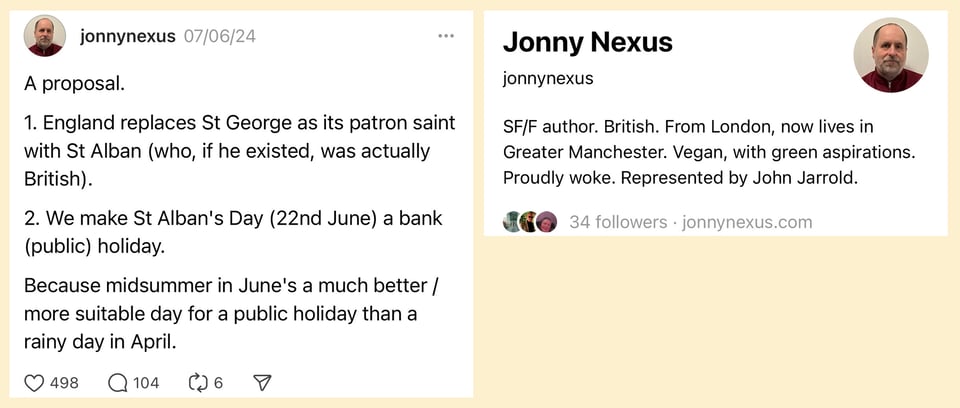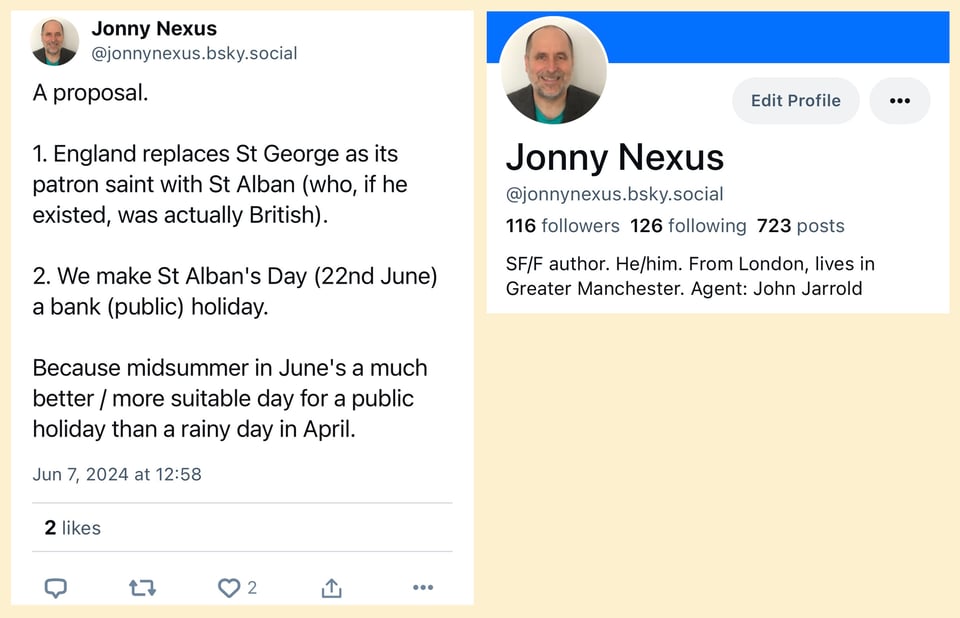Bluesky vs Threads: A Tale of Two Posts
A while ago, I came across an interesting distinction between the two types of social media network, that being connection-based and interest-based.
Put simply, a connection-based social network is one where you see posts by people you’re connected with, i.e. your friends and family. And the classic example of this is Facebook. By contract, an interest-based social network shows you posts on subjects likely to interest you. And the classic example of this was Twitter.
The Internet started off as interest-based. You joined bulletin boards and usenet groups that focussed on subjects of interest to you. (I still fondly remember soc.history.what-if). It was only when Facebook came along that things pivoted to being more connection-based (although in the UK, you could argue that Friends Reunited got there first only to epically drop the baton).
I should point out that the above divisions aren’t hard and fast, since all Social Media networks start with you following people, and most will to some extent show you algorithmic content they think will interest you. The distinctions I’m drawing here are more about the extent to which your user experience is mostly connection-based or interest-based.
Anyhow, we now have a bunch of new contenders in the race to replace the social-media-network-formerly-known-as-Twitter. I’m on three of them: Mastodon, Bluesky, and Threads.
Mastodon and Bluesky are connection-based (at least I think Bluesky at least mostly is). You see posts by people you follow, either posts directly made by them, or posts made by other people that they have either reposted or replied to. This means that you can discover new people who you don’t know in real life, but who are making posts you find interesting, but only organically, via people you’ve already connected with.
Threads (which is owned by Meta, a.k.a. Facebook) is very much an interest-based social media network. Frankly, it comes across — to use a niche joke that only Generation X and above, inhabitants of the North Atlantic Archipelago are likely to recognise — as the “Continuity Twitter”. There is a tab where you can see the people you follow, but the default is to show you an algorithmically generated feed of posts that the network thinks might be of interest to you. (And to be fair, for me, they often are).
And this, from the point of view of the person making the posts (i.e, in this case, me), is where it gets interesting. Here’s a post I made recently on Threads, where at the time, I had a mere 32 people following me.

As you can see, it went sort of semi-viral: nearly 500 likes and over 100 comments. But that was with only 32 followers and 6 reposts, and after all of that I’d only gained two followers. This wasn’t about people who follow me, or know me, or particularly give a damn about me. This was just that I’d made a post that the algorithm sensed people might interact with. And those people did indeed interact with the post, but then forgot about me. (Although the algorithm might perhaps remember me? Hmm…)
And I choose that word “interact” with care, because at the end of the day, interest-based social media networks are less about presenting you with things that interest you as they are about presenting you with things that you might interact with. Which frequently means things that will enrage you. (When Facebook does dip its toes into interest-based content on my feed, it generally shows me anti-vegan, anti-EV, and hard-right posts, which — given that I’m a progressive vegan who owns an EV — is clearly calculated to provoke me into “interacting”).
By contrast, this is how the exact same post on Bluesky fared:

As you can see, the results were very different despite me having around four times the followers. Two likes. No comments. No reposts.
Bluesky showed my post to the people who already follow me, who possibly laughed, and perhaps shrugged and said “Jonny’s on one again”, and then either way, moved on.
Whereas the Threads algorithm took my whimsical, tongue-in-cheek idea and shoved it before the noses of people who might be in the mood for such an idea – and quite possibly people who are heavy Threads users into viewing content and commenting on it. From my point of view, this was very cool. It’s certainly powerful. Ideas can spread must faster and wider when they’re not constrained by the need to hop from person to person. Stranger can talk to stranger and all that.
But the flipside of encountering people you don’t know is that people you don’t know can encounter you, when maybe you were just wanting to talk to your friends. You can make an off-hand thought, comment, or complaint, only to find yourself receiving hundreds of critical and perhaps even hostile comments.
Just as a lie can proverbially be half-way round the world before the truth has got its boots on, anger is generally quicker to react than love and kindness. I worry that an interest-based network like Threads is playing a very risky game, unleashing forces and currents that might inevitably lead to a rage machine.
We will see.